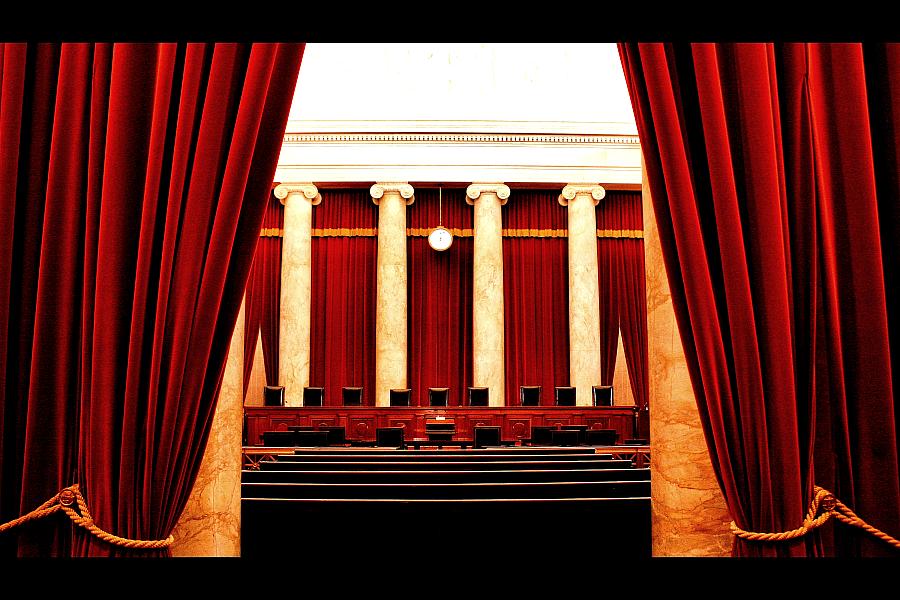Supreme Court decision means health reform is ‘here to stay’

The U.S. Supreme Court voted to uphold the Affordable Care Act’s premium subsidies in a 6-3 ruling that prompted President Barack Obama to say the health law “is here to stay.”
The decision confirms the “common sense notion” that the Affordable Care Act was intended to improve insurance coverage, Gerald Kominski, director of the UCLA Center for Health Policy Research, told Reporting on Health.
“The government’s victory in this case means that today is a great day for everyone who receives subsidies to make insurance more affordable, and for those who fight for health care for all,” he said. “The ACA is still the law of the land, and I expect it to be for a long time into the future, until we can find a way politically to bring everyone into a single system.”
He predicts there will still be challenges to specific provisions of the law, but none that would fundamentally undermine the law as this case would have done had the plaintiffs won.
The King v. Burwell case hinged on tax subsidies and whether they should be available in at least the 34 states that did not establish their own health insurance exchanges. A government loss would have affected coverage for millions of Americans who use those subsidies and could have derailed Obamacare’s expansion of coverage by setting off a “death spiral” of increasing premiums, experts had warned.
"After more than 50 votes in Congress to repeal or weaken this law, after a presidential election based in part on preserving or repealing this law, after multiple challenges to this law before the Supreme Court, the Affordable Care Act is here to stay," Obama told reporters today.
In today’s decision, Chief Justice John Roberts, who wrote the opinion for the court, explained that Congress passed the Affordable Care Act to improve health insurance markets, not destroy them. Roberts, along with Anthony Kennedy, a frequent swing voter, supported the law, as did the court’s four liberal justices: Ruth Bader Ginsburg, Stephen Breyer, Sonia Sotomayor and Elana Kagen. Conservative Justice Antonin Scalia was joined by Justices Clarence Thomas and Samuel Alito in the dissent.
Check out the following links for more coverage and analysis of today’s ruling:
- In this L.A. Times analysis, Noam N. Levey writes that the ACA is “about as firmly ensconced as a law can be in a politically divided country” and that “a growing number of Republican governors are signaling their interest in moving on.”
- In The Wall Street Journal, Drew Altman writes that “The outcome of the 2016 presidential election could still prove decisive for the health-care law.”
- Adam Liptak of The New York Times writes that the ruling “means that it is all but certain that the Affordable Care Act will survive after Mr. Obama leaves office in 2017, and will give it a greater chance of becoming an enduring part of America’s social safety net.” Here’s another interesting piece from the Times looking at highlights from the decision itself.
- In this analysis, Politico’s Sarah Wheaton writes that “Congressional Republicans are plotting ways to fundamentally change the law if they have an ally in the White House come January 2017. So supporters of the health law cannot truly ‘move on’ either unless a Democrat succeeds Obama.”
- ABC News has a reaction piece in which consumers using tax subsidies for their health insurance share their stories – and highlight how important the affordable premiums are for themselves and their families. The Washington Post offers this reaction piece from Capitol Hill, with some Republican Congressmen calling the ruling “a shocker” and vowing to replace Obamacare. And here’s an interesting Storify of reactions from New York Magazine.
- The Daily Beast’s Michael Tomasky has a smart round-up the winners and the losers in the case, with predictions on what’s next. The most interesting question, he writes, is what will happen in states that have resisted expanding Medicaid, now that today’s decision signals a clear victory for health reform. “So I think pressure will now start to build in states that have resisted playing ball to do so. And the pressure won’t come just from the uninsured, who have no political power. It will come from hospital associations that stand to benefit financially from the law, which is withdrawing other kinds of Medicaid support from states on the expectation that they’ll take Medicaid money to set up exchanges. It will come from doctors’ groups. It will come from business interests.”
- Justice Scalia’s dissent is getting a lot of attention with its “zingers, applause lines and harshly worded criticism.” Here’s Time’s round-up of the best seven lines.
[Photo via Wikipedia Commons.]
